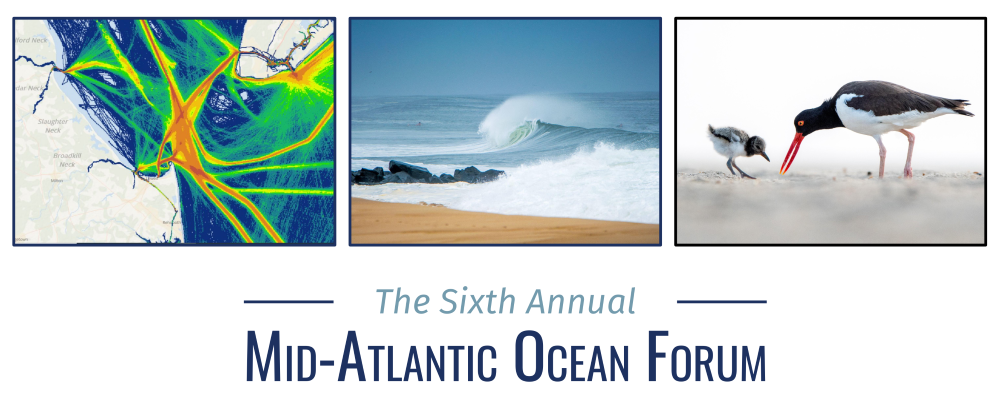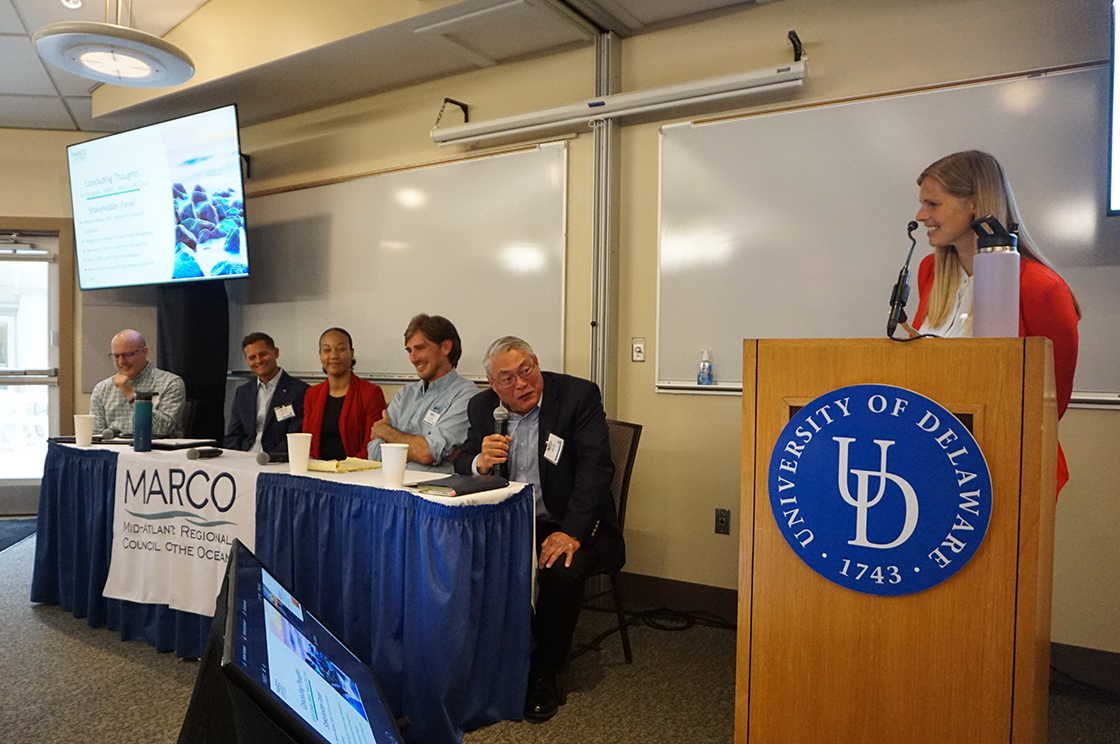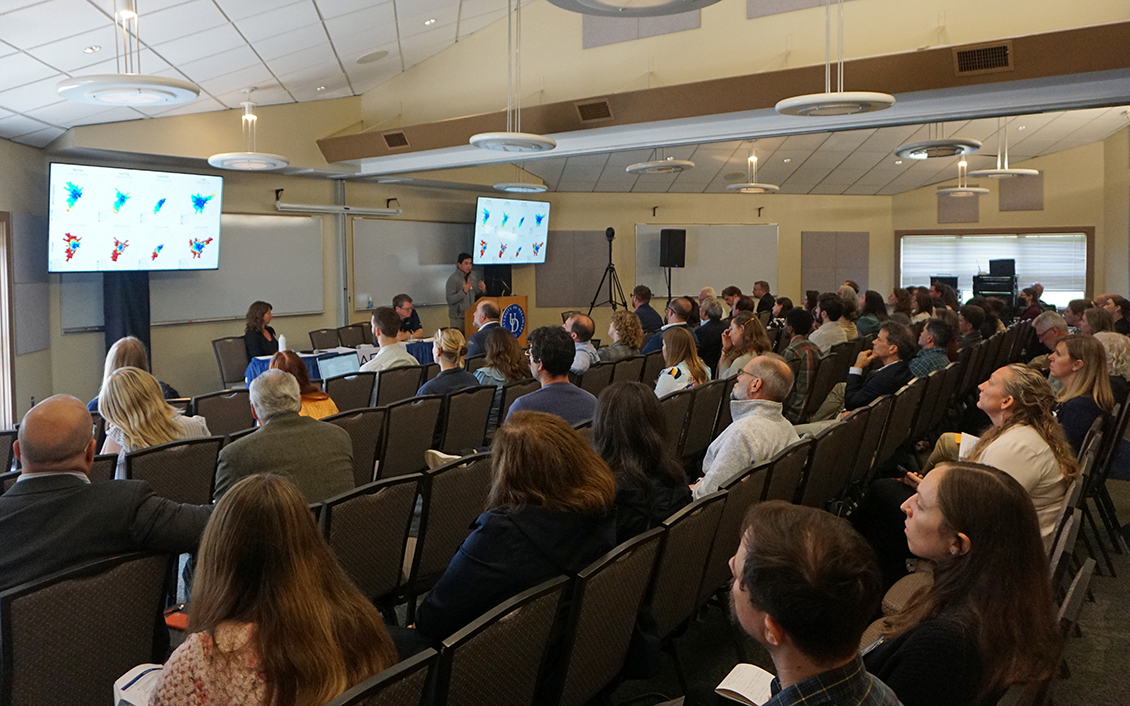
The free event featured expert presentations and discussions on topics including climate-ocean action, sustainable ocean economies, ocean conservation and healthy ecosystems, marine spatial planning and data-sharing, a student poster session, and much more.
Goal: Foster robust information exchange and collaboration across multiple state and federal government agencies, Tribes, non-governmental entities, and ocean stakeholders to promote informed decision-making around regional ocean planning.
Objectives:
- Increase awareness and understanding of state, federal, Tribal, and regional fisheries management programs and other efforts to advance a sustainable ocean economy and a healthy ocean ecosystem
- Identify and assess key issues and opportunities that could benefit from regional coordination and collaboration
- Invite stakeholders to provide input on regional ocean planning activities
- Promote collaborative partnerships among diverse stakeholders, leveraging collective expertise and resources for the sustainable management of the Mid-Atlantic Ocean region


FORUM AGENDA & VIDEOS
Day One: Monday, May 13
Opening Remarks
Avalon Bristow, Executive Director of Mid-Atlantic Regional Council on the Ocean (MARCO)
Tony MacDonald, Director of the Urban Coast Institute at Monmouth University
Plenary
Kristi Lieske, Delaware Department of Natural Resources and Environmental Control
Leslie Reese, Delaware Department of Natural Resources and Environmental Control
Data Sharing and Marine Spatial Planning
Moderator: Kevin Hassell, New Jersey Department of Environmental Protection (NJDEP)
Implementing Data Governance for Collaborative Ocean Data Sharing (Dr. Rachael Blake, Intertidal Agency)
East Coast Climate Change Scenario Planning Initiative: Informing a Coordinated East Coast Fisheries Management Response to Change (Kiley Dancy, Mid-Atlantic Fishery Management Council)
Marine Life Distribution and Abundance Model Updates (Jesse Cleary, Duke University Marine Geospatial Ecology Lab)
Data Sharing and Marine Spatial Planning (cont.)
Moderator: Nick Napoli, Northeast Regional Ocean Council (NROC)
Coordinating with Mid-Atlantic Partners to Support the Sustainable Development of Offshore Wind Energy Along the US East Coast (Mike Crowley, Mid-Atlantic Regional Association Coastal and Ocean Observing System [MARACOOS])
Spatial Planning in Action: GIS Support for an Offshore Wind Construction Operation Plan (Gwen Lockhart and Todd Gys, Tetra Tech)
Introduction to the Rutgers University Weather Research and Forecasting (RUWRF) Model Dataset (James Kim, Rutgers University Center for Ocean Observing Leadership)
Ocean Justice in the Mid-Atlantic: Breakout Sessions Facilitated by Raben Group
Topic 1: Identifying Underserved Communities in Regional Ocean Planning
Topic 2: Harnessing Effective Communication for Ocean Justice
Topic 3: Broadening Equitable Access to Public Lands and Waters
Coastal Communities and Habitat: The human dimension, aquaculture, carbon, and beyond
Moderator: Paul Ticco, New York State Department of State
Connecting Sea Grant, the National Centers for Coastal Ocean Sciences, and coastal-ocean communities in the Mid-Atlantic to improve sustainable aquaculture siting and development (Hannah Cooper, Maryland Sea Grant)
Assessing Variability of Blue Carbon Stocks Across Scales and their Fate Under Sea Level Rise (Dr. Molly Mitchell, Virginia Institute of Marine Science)
Where Does the Carbon Go? Exploring Carbon Dynamics in a Temperate Salt Marsh (Rodrigo Vargas, University of Delaware)
Day Two: Tuesday, May 14
Opening Remarks and Plenary
Kaitlyn Dykes, Delaware Department of Natural Resources and Environmental Control
Monitoring and Characterization of Ocean and Coastal Changes
Moderator: Will Isenberg, Virginia Coastal Zone Management (VACZM)
Acidification Data Layer: A tool for monitoring site selection (Dr. Janet Reimer, Mid-Atlantic Coastal Acidification Network)
The Shellfishes’ Silent Struggle: a case for acidification monitoring (Stephen Tomasetti, University of Maryland Eastern Shore)
ECO-Gliders: An autonomous-based oceanographic and ecological mission to inform offshore wind development (Dr. Josh Kohut, Rutgers University)
Enhancing Coastal Resilience through Better Water Level Data and Information Products (Mary Ford, MARACOOS)
Concurrent Breakout Sessions: Engaging and Understanding Communities for Marine Resource Management
Featured in Video: Marine Debris CBSM and Policy Perceptions
Mid-Atlantic Survey Results (Steve Raabe, OpinionWorks)
Facilitated discussion (John Kuriawa, NOAA Office of Coastal Management)
Additional Sessions (Not Seen in Video)
Our Changing Ocean – understanding community needs and priorities and connecting people with resources (Alexandra Puritz, NOAA Ocean Acidification Program)
Mid-Atlantic Marine Sanctuaries (Leann Hogan, NOAA Office of National Marine Sanctuaries)
The Seafloor: Sand and Sediment Management
Moderator: Ursula Howson, Bureau of Ocean Energy Management (BOEM)
BOEM’s Holistic System’s Approach to Sand Resources and Ecosystem Balance (Jeffrey S. Waldner, BOEM Marine Minerals Program)
A Balancing Act: Applied Science for Environmentally Responsible Use of Outer Continental Shelf Sand Resources (Victoria Brady, BOEM)
Modeling and mapping 21st century beach sand supply and demand along the Delaware-Maryland Atlantic coastline and beyond (Daniel L Warner, Ph.D., Delaware Geological Survey)
The Seafloor: Habitat
Temporal Variability in the Highly Migratory Shark Assemblage on a Dredged Shoal (Benjamin Marsalay, University of Delaware)
Shoreface Sand Ridge Structuring of Fish Habitat off New Jersey (Thomas Grothues, Rutgers University)
Regional Wildlife Science Collaborative Habitat and Ecosystem Regional Seafloor Activities (Nikelene McLean, RWSC Habitat Subcommittee Lead)
Stakeholder Panel
Nikelene McLean, RWSC
Wright Frank, BOEM
Ryan Green, Virginia Coastal Zine Management
Stuart Griffin, Griffin Maritime Strategies
Alan Lee, Mushin Sportfishing, Hudson Canyon SAC Chair
Closing Remarks
Facilitator: Tony MacDonald, Monmouth University Urban Coast Institute
